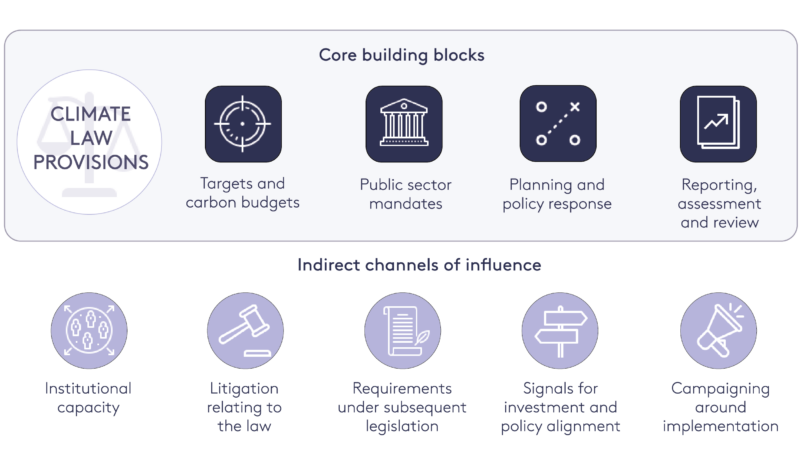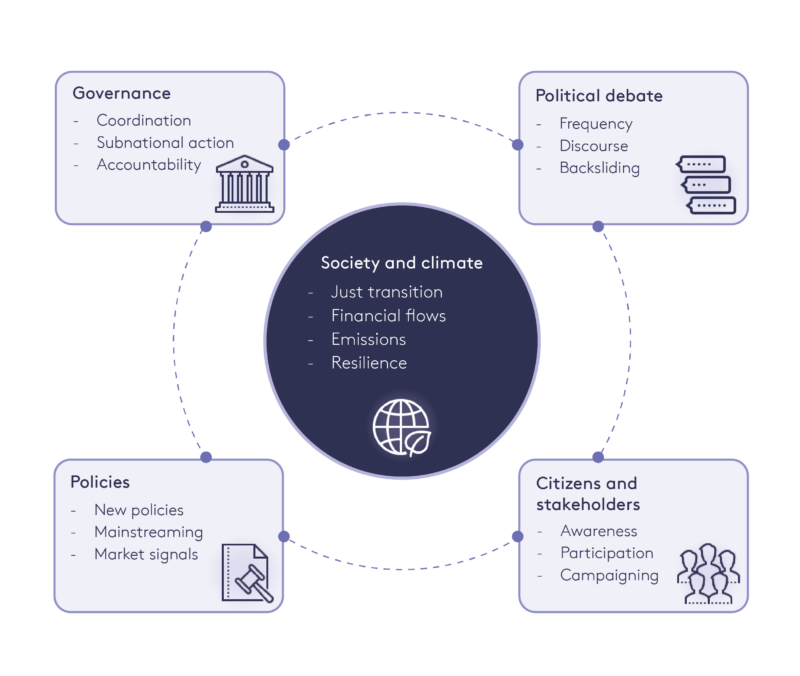Impacts of climate framework laws: lessons from Germany, Ireland and New Zealand

Downloads
Nearly 60 countries around the world have introduced climate change framework laws, which establish the strategic direction for national climate change policy and often the institutional arrangements for climate action too. As the global stock of climate framework laws increases, it is critical to understand the impacts of such legislation. This report and accompanying technical annex analyse the impact of climate framework laws in three countries, Germany, Ireland and New Zealand, based on evidence from 73 expert interviews and desk research. The report covers impacts on: climate governance; political debate; climate policies; citizens and stakeholders; and society and climate.
The main report sets out an introduction to each of the case study countries and an overarching analysis of how climate laws have impact and the types of impact they produce; this is accompanied by policy recommendations for legislators, policymakers, business and civil society groups.
The technical annex provides more in-depth description and analysis of interviewees’ views.
Summary points
- The common feature among climate framework laws is that they are ‘overarching’, ‘unifying’ or ‘comprehensive’ in their nature and they seek to provide a coherent legal basis for climate action in the respective jurisdiction.
- Germany, Ireland and New Zealand were chosen as case studies as each has had its climate framework law in place for several years and has gone through at least one substantive amendment, enabling exploration of changing perceptions of the laws’ impacts as they have evolved.
- Climate framework laws in the three countries are delivering on several key expectations that are associated with the objectives of such all-encompassing laws.
- Climate framework laws are helping address governance challenges and build effective institutional frameworks and processes on climate change.
- Debate around the adoption of climate framework laws can help consolidate political consensus on climate change, while implementation requires sustained political pressure and public participation.
- Climate framework laws can contribute indirectly to enhancing public awareness and support for climate action, but this requires explicit provisions on public participation and targeted communication and engagement efforts.
- Shortcomings in legislative design and changes in political commitment to climate action can weaken the effectiveness of climate laws.
- Climate framework laws strengthen the basis for civil society to campaign for climate action, but there is also a risk of legislation weakening climate movements or being used as an excuse for inaction.
- Climate framework laws drive change in different ways and we have identified nine channels of influence, four of which are directly created by provisions forming the core building blocks of climate laws and five of which are less directly connected to the laws, with typically more diffused impacts. The channels are illustrated in Figure 1.
Figure 1. Channels of influence through which climate framework laws exert impact

Summary recommendations
- Countries that currently have no climate framework law should consider adopting such a law, to help strengthen national climate governance and enable more ambitious climate action.
- Legislators and policymakers should ensure that legislation includes provisions on or makes a reference to provisions already established elsewhere, including: a long-term net zero target, interim targets or carbon budgets consistent with the Paris Agreement; and requirements for the iterative development of climate action plans and policies, for public bodies to carry out their functions in alignment with climate goals, and for regular reporting on delivery and assessment of progress.
- Governments should create new institutions for coordination and accountability, or strengthen the mandates of existing ones. Anchoring these institutions in the law helps protect against political change.
- Campaigners, advocacy groups and civil society should incorporate the most impactful building blocks of climate legislation into campaigns for governance reforms.
- Governments, civil society and commentators should make concerted efforts to increase public awareness of the purpose of legislation and climate action more broadly, emphasising national ownership and the benefits of transition.
- Governments should ensure that measures to meet targets and other obligations under the climate framework law are communicated in an accessible way to citizens and promote inclusive public participation processes.
- Campaigners should work to maintain momentum around the development, assessment and delivery of policies and plans; consider how to best leverage the accountability mechanisms built into law; assess potential risks around the use of litigation as a tool to raise ambition or enforce implementation; and be careful not to discourage sectors that are delivering on their targets or budgets.
Figure 2. Impacts of climate framework laws


